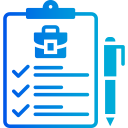Cloud, Automation, and Modern Tooling Basics
Know what virtual machines, containers, object storage, and virtual networks do. Recognize regions, availability zones, and pricing basics. A junior who prevents a runaway bill by spotting misconfigured storage earns immediate gratitude and lasting credibility.
Cloud, Automation, and Modern Tooling Basics
Set up simple pipelines to run tests and linting on every push. Automate checklists, not judgment. Shipping tiny changes frequently reduces risk and stress. Share your first automation win, no matter how small, and inspire another beginner.







